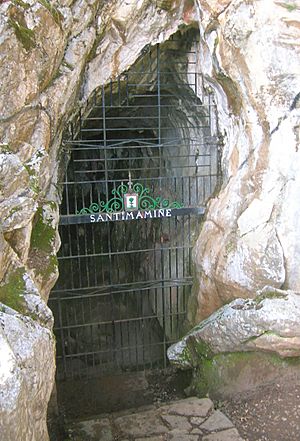Santimamiñe facts for kids

Entrance to the cave
|
|
| Location | Kortezubi (Biscay), Spain |
|---|---|
| Official name: Santimamiñe | |
| Type: | Cultural |
| Criteria: | i, iii |
| Designated: | 1985 (9th session) |
| Part of: | Cave of Altamira and Paleolithic Cave Art of Northern Spain |
| Reference #: | 310-016 |
| Region: | Europe and North America |
| Official name: Cueva de Santimamiñe | |
| Type: | Non-movable |
| Criteria: | Monument |
| Designated: | 17 July 1984 |
| Reference #: | RI-51-0005165 |
The Santimamiñe cave is a very important archaeological site in the Basque Country region of Spain. It is located near the town of Kortezubi in Biscay. This cave holds many clues about how people lived long, long ago. Scientists have found evidence of human life here from the Middle Paleolithic (Old Stone Age) all the way to the Iron Age.
This means people lived in Santimamiñe cave for thousands of years! Different groups of people, or "cultures," used the cave over time. These include:
- Mousterian (used by Neanderthals)
- Chatelperronian
- Aurignacian
- Gravettian
- Solutrean
- Magdalenian
- Azilian
There are also signs of people from the Neolithic (New Stone Age), Chalcolithic (Copper Age), Bronze Age, and Iron Age.
Amazing Cave Paintings
The Santimamiñe cave is most famous for its incredible cave paintings. These artworks were made during the Magdalenian period, which was a time in the Late Stone Age. The paintings show animals like bisons, horses, goats, and deer. These ancient artists used the cave walls as their canvas!
Why Santimamiñe Was Important
The cave's great location probably helped it stay a popular home for so long. It sits above the Urdaibai estuary, which is where a river meets the sea. This area would have provided plenty of food and resources. First, Neanderthals lived here, and later, early Homo sapiens (our ancestors) made it their home.
A World Heritage Site
Since 2008, Santimamiñe cave has been part of a special group of caves. It is now a World Heritage Site recognized by UNESCO. This means it is considered very important to human history and should be protected. It is listed as part of the "Cave of Altamira and Paleolithic Cave Art of Northern Spain" site.
See also
 In Spanish: Cueva de Santimamiñe para niños
In Spanish: Cueva de Santimamiñe para niños
- Art of the Upper Paleolithic
- List of Stone Age art

